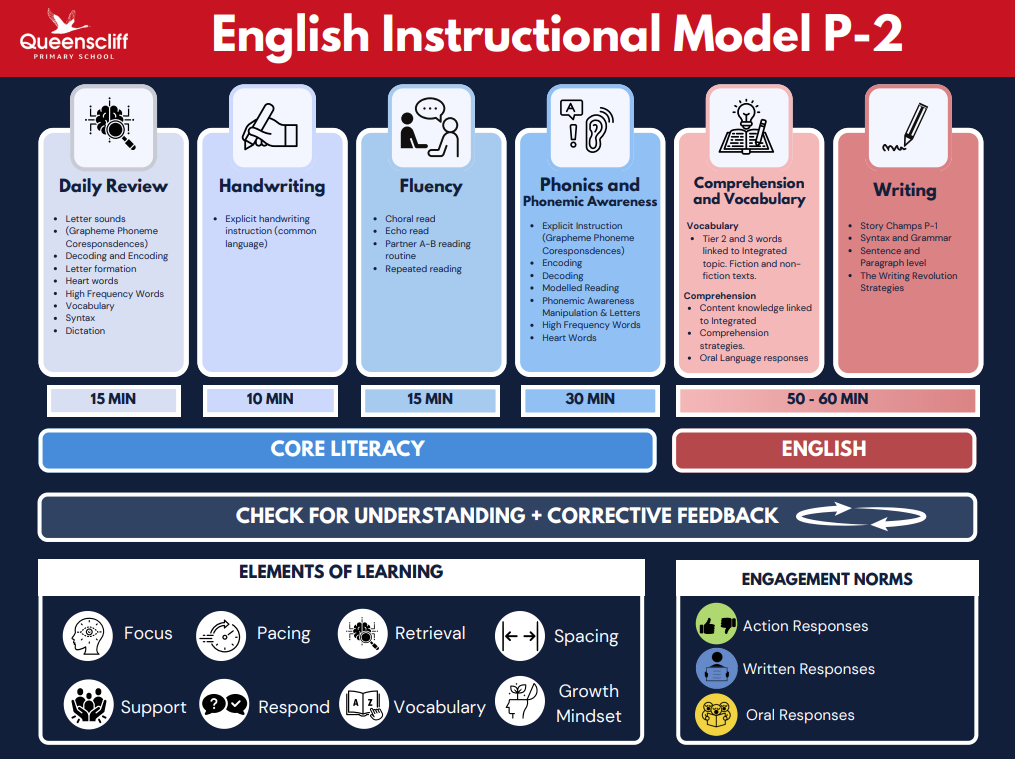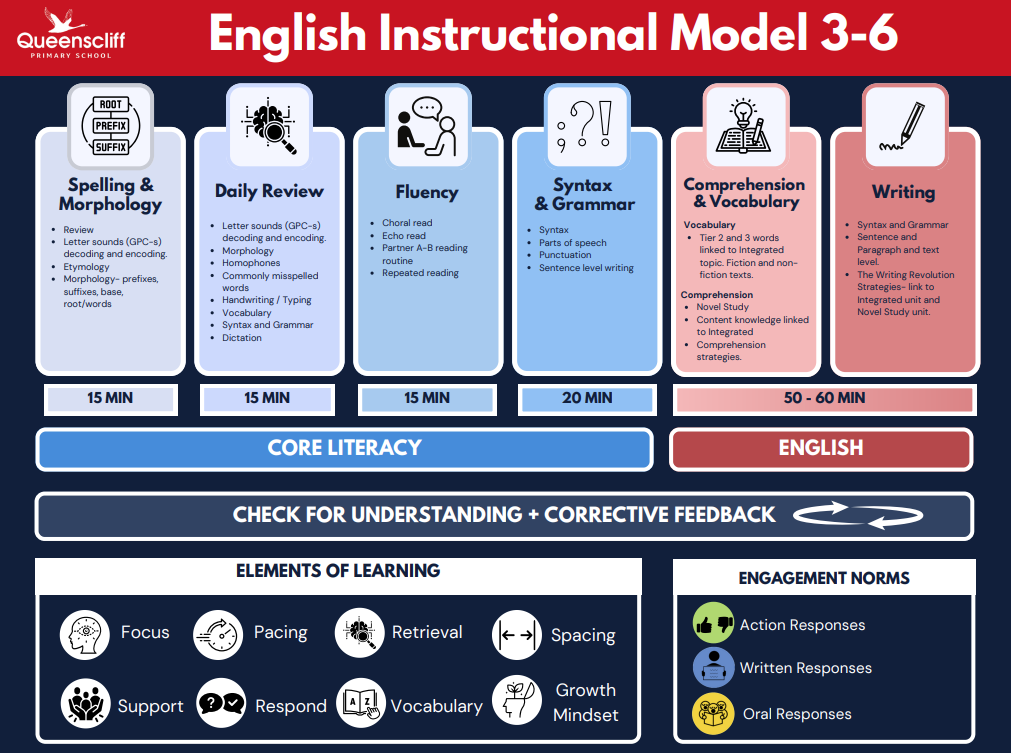Literacy Curriculum
At Queenscliff Primary School, our Literacy program aligns seamlessly with the Victorian Curriculum F-10 and provides fundamental skills, strategies and attitudes towards learning. We aim to foster a lifelong love of reading in our students, as well as confidence in their writing and effective interpersonal and communication skills. We believe all students can achieve success in Literacy and transfer these skills into their daily life to be active and informed citizens in our community.
Instructional Model
Queenscliff Primary School practises a consistent approach to all literacy programs using our Literacy Instructional Models for Prep to Year 2 and Year 3 to 6. At QPS, our weekly literacy program incorporates the seven fundamental components of literacy, including:
- Phonemic Awareness - the ability to hear and manipulate individual sounds in words
- Phonics - the understanding that letters represent the speech sounds of our language
- Vocabulary – the knowledge of words and their meanings in context that we must know to communicate effectively
- Fluency - the ability to read text accurately, quickly and with appropriate expression
- Comprehension – the ability to make meaning from texts through literal, inferential and critical understanding
- Grammar – the ability to understand the constructs of the English language, including morphology, syntax and punctuation
- Oral Language – the ability to use words and sounds to communicate meaning
Our Instructional Models for Prep to Year 2 and Year 3 to 6 vary. This is due to a greater focus on phonics, phonemic awareness, oral language and fluency in the younger years and a greater emphasis on morphology, comprehension, grammar and writing skills in Year 3 to 6. Students in Year 3 to 6 engage in termly novel studies whereby students are exposed to a range of diverse, rich texts including persuasive, narrative, informative and hybrid texts. Throughout the novel study, students not only expand their vocabulary and understanding of comprehension skills, but learn key concepts and principles of grammar and syntax that are essential for writing development.
English Instructional Models


Spelling
In the early years, we teach our students to read, spell and write using fun, engaging and evidence-based practises. We teach with a structured, systematic and explicit literacy program with engaging multisensory activities to foster students’ understanding, skills and knowledge of literacy.
Our literacy programs are carefully sequenced in seven stages to teach children the 44 sounds of the English language and the principles of the alphabetic code (that each speech sound can be represented by different groups of letters, such as the sound /ī/ as in I, sky, pie, ice, cycle, and that a letter(or group of letters) can represent different sounds, such as the letter ‘y’ in yes, gym, funny, sky. We start with teaching the simple code in Stages 1–4. We focus on phonics and phonemic awareness to build the strongest foundations for reading and spelling success.
Across all year levels we follow a structured literacy approach. Children learn at a quicker rate if they are taught systematically and explicitly using synthetic phonics and a structured literacy approach. They know what they are learning and can verbalise it.
Our Literacy Instructional Model incorporates explicit teaching, shared construction and individual exploration, reflective of a gradual release framework. Our teachers follow an “I do, we do, you do” structure during Literacy instruction.
- I do - teacher instructs and provides a model for literacy instruction
- We do - guided practice supported by the teacher in understanding and mastering the literacy concept
- You do - the learner practises/applies new content independently – moving towards mastery.
We focus on building knowledge, speaking, and listening and vocabulary skills to develop equally strong foundations in literacy. Students will develop these skills by being exposed to language rich units, non-fiction texts and authentic texts.
Spelling Mastery
Students in Years 3 to 6 at Queenscliff Primary School engage in daily spelling activities through the implementation of the Spelling Mastery program. Spelling Mastery builds dependable spelling skills for students through a highly structured direct instruction method that blends the following approaches:
- Phonemic approach - helps beginning spellers learn the relationships between spoken sounds and written letters and then apply them to spelling
- Morphemic approach - exposes advanced spellers to prefixes, bases, and suffixes
- Whole-word approach - gives spellers at all levels the meaning and root of a word and shows how the word's spelling is influenced.
Spelling Mastery interweaves these three approaches according to students' skill development. Explicit instruction, careful selection of spelling words, and repeated and cumulative practice will helps our students master each concept and reinforce and retain key information. The program uses an explicit, teacher-directed method of teaching called 'Direct Instruction'. Spelling Mastery is an effective, research-proven spelling program that teaches students the strategies they need to become successful, life-long spellers. The Spelling Mastery program is differentiated and students are grouped to work with different teachers throughout the week to ensure that their spelling instruction is delivered at their point of need.
Reading
At QPS, our teachers deliver high quality reading programs aimed at enhancing students’ vocabulary, comprehension, fluency and oral language. Throughout the week, students will engage in a diverse range of evidence-based pedagogical practices to foster literacy development, including:
- Modelled Reading - Explicit teaching of decoding, comprehension, fluency
- Guided Reading - Small groups with levelled instructional texts focused on reading strategies, comprehension, decoding, vocabulary and fluency
- Shared Reading / Cooperative Reading - Whole class or small group reading focused on strategies, comprehension, decoding and fluency
- Independent Reading - Student reads a text independently and is at a level suitable for the student to gain meaning and comprehension without support from the teacher
- Echo Reading – Whole class, small group or paired reading focused on fluency and expression
- Choral Reading – Whole class or small group reading focused on fluency and expression
- Paired & Partner Reading – Students are paired with a levelled text suited to their reading ability to focus on comprehension, fluency and development of oral language skills
- Readers’ Theatre – Small group reading through story-telling and roleplay focused on fluency, expression and comprehension.
Formative Assessment
Our teachers engage in ongoing formative assessment using PM Benchmark, DIBELS and Fountas and Pinnell to continually monitor students’ reading progress and to inform the planning and delivery of reading programs across the school.
Reading Strategies
Our reading program from Year 1 to Year 6 explicitly teaches reading strategies to enhance students’ ability to make meaning from the texts they read. We teach 12 strategies from Prep to Year 6 including:
- Finding the Main Idea
- Recalling Facts and Details
- Understanding Sequence
- Recognising Cause and Effect
- Comparing and Contrasting
- Making Predictions
- Finding Word Meaning in Context
- Drawing Conclusions and Making Inferences
- Distinguishing Between Fact and Opinion
- Identifying Author’s Purpose
- Interpreting Figurative Language
- Distinguishing Between Fact and Opinion
Writing
Our students learn to write authentic, rich texts intended to be read by others, and are guided through the writing process through explicit teaching and worked examples. Students learn to identify and use the different features from various genres, such as narrative, informative and persuasive texts. Through our comprehensive writing programs, our students learn to understand the organisation and structure of texts, language features, the author’s purpose and voice, sentence structure and the conventions of writing, including grammar and punctuation. Our teachers apply our Literacy Instruction Model with the Writing Cycle, of Modelled Writing, Joint Construction, and Independent Writing, to deliver comprehensive and differentiated writing programs. Our students are nurtured to become confident and capable writers. Writing programs are unit based and genre-focused relating to the Integrated Studies topic or relevant school-based experiences that follow the guidelines of the writing process of plan, draft, revise, edit and publish.
At our school, we are committed to developing strong, confident communicators. Through the integration of The Writing Revolution (TWR) practices across all year levels and subject areas, we explicitly teach students how to structure their thinking and express their ideas clearly and effectively. By embedding sentence-level strategies, paragraph development, and planning techniques into everyday learning, we support students to deepen their understanding of content while building essential writing skills. These evidence-based practices empower our students to become thoughtful writers and critical thinkers, preparing them for success in all areas of their education.
Handwriting
Handwriting is explicitly taught within our literacy programs between 30 to 45 minutes per week. Our teachers model correct letter formation using the Victorian Handwriting Style and students begin to learn cursive writing in Year 3.
Literary Festival
Our students are provided with the unique opportunity to participate in the Literary Festival in the Borough annually. Students celebrate literacy by attending workshops with published authors and are provided with learning experiences to further develop their skills and confidence as capable writers.
All students are fostered to pursue their literacy skills with a growth mindset, developing resilience and responsibility in their approach to learning.
